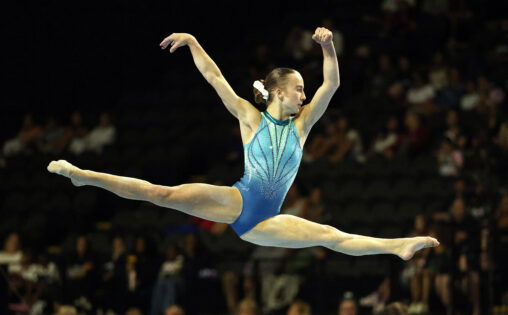For a sport that leans on precision, any miscalculation carries lasting implications. Only last year at the 2024 Winter Cup, Olympic champion Suni Lee received a beam score inconsistent with her visible execution. After falling midway through her acro series, effectively nullifying two key composition requirements, her 5.0 D-score prompted questions, none of which were adequately addressed. The pattern continued this year at the Winter Cup, too. With Ashlee Sullivan’s misclassified vault getting a 4.2 and Claire Pease’s incomplete pirouette getting 5.3, both contributed to scores that didn’t align with the routines actually performed. And at the U.S. Classic this year? Looks like it’s the same story.
When Myli Lew’s uneven bars routine this year at the U.S. Classics registered a score influenced by skill repetition and questionable composition credit, the conversation escalated beyond a single athlete’s tally. Lew got a score of 14.050, which was heavily debated. Though a podium tie ultimately prevented anyone from being excluded from medals, the fundamental issue remained.
The 2025 U.S. Classic was not the beginning of the issue. It was simply another example in a long sequence of judgment breakdowns. While the FIG’s overhaul of the scoring system two decades ago sought to eliminate these very lapses, by separating difficulty from execution and widening scoring possibilities, the system still hinges on one fragile component: the human element.
In 2004, Paul Hamm was awarded gold due to a judging mistake, even as South Korea’s Kim Dae-eun watched his rightful place slip away. In 2025, Jordan Chiles’ inquiry over her vault at Worlds was denied on the grounds that her team filed it four seconds too late. And FIG’s response? Well, the FIG admitted during a hearing that no clear record existed of who logged the inquiry’s timestamp. When procedural rigor breaks down, outcomes become negotiable. And faith in the system begins to erode.
Final Standings from the Senior Women’s Competition at #USClassic presented by Saatva
Full routines from tonight’s session can be found on the USAG YouTube Channel! https://t.co/cDJr5sM4Vx pic.twitter.com/PsbnYwfcWu
— USA Gymnastics (@USAGym) July 20, 2025
This erosion is not confined to elite competitions. NCAA gymnastics, popular for its showmanship and energetic fan base, has long been at the center of scoring scrutiny. And these aren’t rare outliers. They’re recurring symptoms of a system that’s either overloaded, under-monitored, or simply unwilling to adapt further. Despite the reforms, despite decades of trial, gymnastics still finds itself shadowed by the question of fairness. No routine, no matter how clean or daring, can stand independently of the score it receives. And when that score is built on a flawed evaluation, the athlete is not the only one shortchanged. The sport is, too. And fans online were outraged about the same.
Fans call out judging errors after U.S. Classic sparks fresh controversy
As soon as the incident became public, fans flocked to the comments section. Referencing Claire Pease’s misjudged pirouette from the Winter Cup, one fan drew a parallel to an older oversight, recalling that “during 2013 nationals the judges completely brain farted and gave [Brenna Dowell] 2.5 CR… where she didn’t have a full twisting element.” The comparison reinforces that such lapses aren’t new—they’re part of a pattern the community hasn’t forgotten.
In Myli Lew’s case, another fan highlighted a specific bars miscalculation, explaining that “she really should have gotten a 5.6 instead of the 5.8 she got,” based on FIG rules about repeated elements and root skills. This fan’s detailed code interpretation validated the widespread view that Lew’s medal position was skewed by an uncorrected technical error.
Even without full code fluency, a commenter admitted, “the bars section of the code has always been my Achilles heel… but still, the fact remains that the judges got her D-score wrong.” Their willingness to defer to others while still recognizing the error underscored how glaring the discrepancy was, evident even to casual but informed followers.
Responding to the surge of posts, one fan remarked, “Hopefully the USAG people who sometimes show up here see this and help get it to the right eyes.” This statement wasn’t just gratitude—it was a call to action, asking those within the system to pay attention and intervene before judging inconsistencies become institutional failures.
Broadening the discussion, a commenter asked, “if it’s been happening more frequently than usual… or if it’s unique to the US.” That reflection tied directly into past examples like Suni Lee’s beam scoring in 2024 and Jordan Chiles’ inquiry denial in 2025—evidence that flaws may not only be recurrent but potentially global. Thus, with a lot of concerns around, it remains to be seen how things pan out in the future.
The post Gymnastics Fans Sound Off as Judging Controversy at U.S. Classic Erupts Online appeared first on EssentiallySports.
